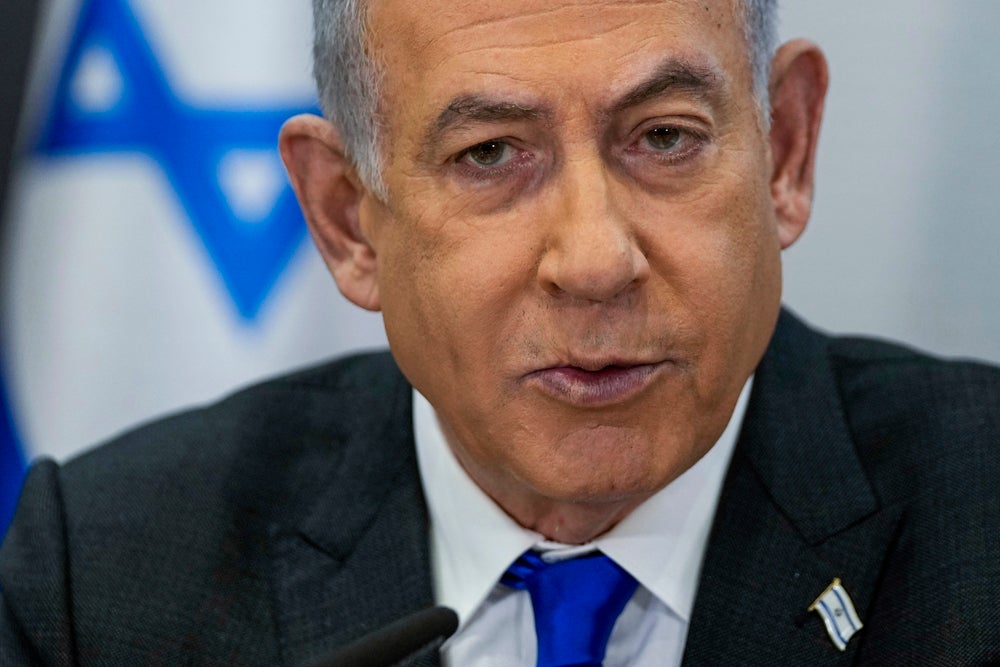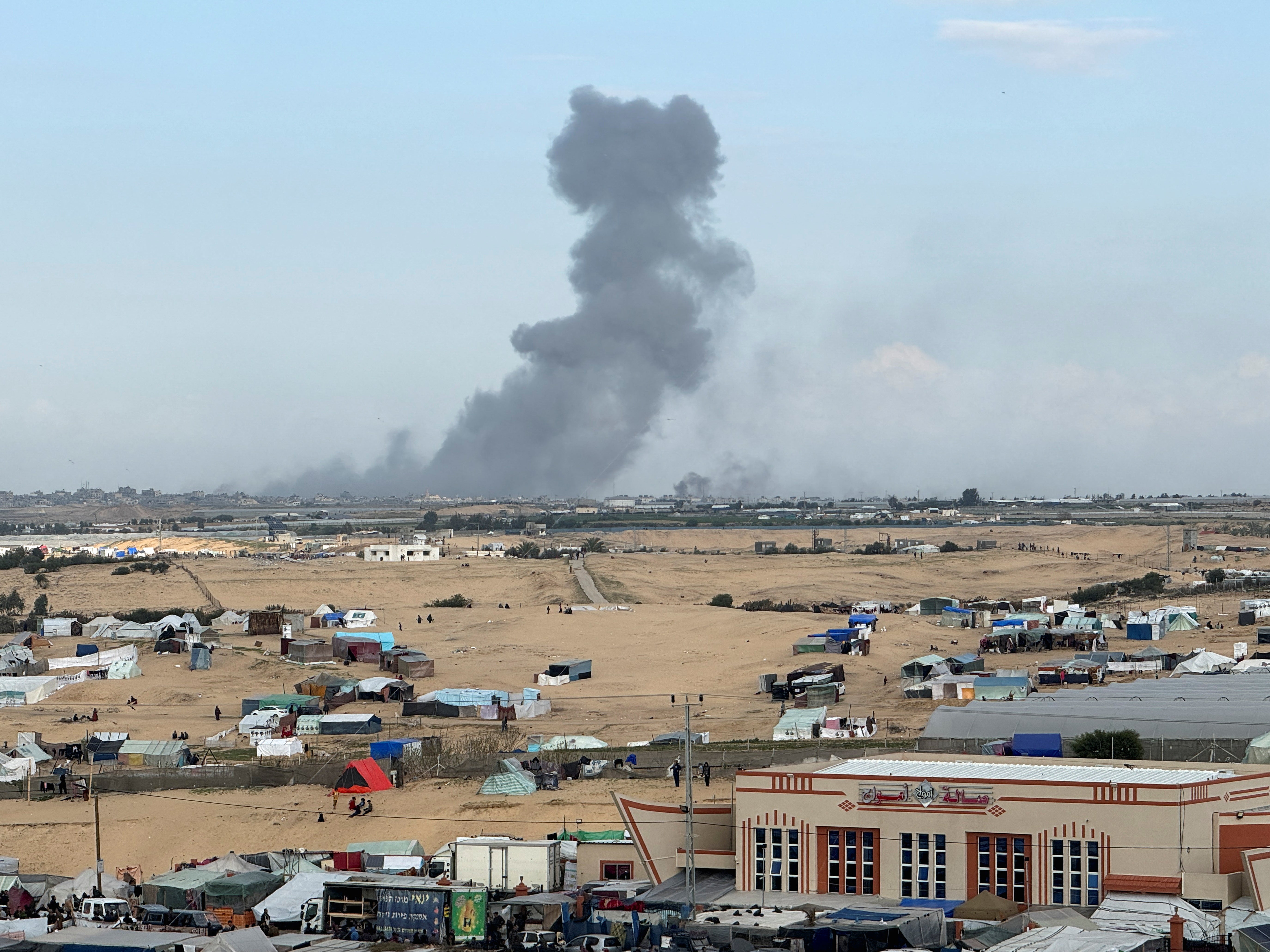Israel orders evacuation of last major hospital in southern Gaza – as doctors say it is under siege
Staff at Nasser hospital in Khan Younis say they have faced weeks of sniper fire and constant bombing. Meanwhile, ceasefire talks hit fresh roadblock as Benjamin Netanyahu says only a change in the demands of Hamas will bring progress
The Israeli military has ordered an evacuation of the last major hospital in southern Gaza after a deadly siege, the World Health Organisation has warned. It came as ceasefire talks in Egypt ended with no breakthrough and Israeli prime minister Benjamin Netanyahu saying that only a change in the “ludicrous” position from Hamas will see negotiations move forward.
WHO chief Tedros Adhanom Ghebreyesus expressed alarm at the situation in Nasser hospital, which he described as “the backbone of the health system in southern Gaza”. He said civilians had been killed in the complex which is located in the town of Khan Younis, people had been ordered to evacuate and that it had been under a week-long siege.
“Hostilities have reportedly destroyed storage facilities for medical equipment and supplies. Access to the hospital remains obstructed – there is no safe corridor for those in need,” he wrote on X, formerly Twitter.
“Two WHO missions have been denied in the last four days and we lost touch with the hospital’s personnel,” he added.
Videos reportedly taken within the hospital and shared with The Independent showed people dashing between open courtyards within the hospital, under heavy gunfire as they tried to rescue the wounded on stretches. Other videos said to have been filmed on Wednesday morning showed distraught crowds, including wounded women and children, packing the scant supplies they had.
Gunfire killed a patient and wounded six others on Thursday, according to medics.
Doctors inside Nasser hospital told The Independent they first received an evacuation order on Tuesday via speakers attached to drones, and from a Palestinian man who they believed had been detained by the Israelis and ordered to deliver the message.

In voice notes shared with The Independent, one surgeon, Khaled al-Serr, said they had been “under siege” for weeks, people had been shot as they tried to leave the facility even after the evacuation order was given and the bombing nearby had been “constant”.
“Tanks and snipers are surrounding the hospital in all directions,” he continued.
Cogat, the Israeli defence ministry unit that liaises with the Palestinians, accused Hamas of conducting “military activities within Nasser hospital complex” and using the facility to host hostages in a tweet posted to social media. This has been denied by medical staff. The Independent has not been shown evidence of these claims.
In a statement, the Israeli military said it had opened a “secure route” to evacuate displaced civilians taking shelter in the hospital in a “controlled and precise manner”.
They said that the military did “not intend to evacuate patients and medical staff” but did not confirm or deny whether they had begun a full evacuation anyway.
The news came amid mounting concerns for civilians in southern Gaza as truce talks held in Cairo involving the United States, Israel, Egypt and Qatar ended without a breakthrough on a deal and no date announced for a new meeting.
Israeli prime minister Benjamin Netanyahu said that there had been no new offer from Hamas and that only a change in their “ludicrous” demands would make it possible to move forward. Mr Netanyahu’s remarks came hours after local media reported that the Israeli leader had ordered an Israeli delegation not to continue talks in Cairo.

Israel has repeatedly vowed to continue its ground assault in Gaza by pivoting from Khan Younis and pushing south into Rafah, a city located along the border with Egypt that it claims is the last stronghold of Hamas. It is now home to around 1.5 million, with many living in tents, after fleeing Israeli bombardments elsewhere in Gaza. Speaking to The Independent, families have repeatedly said they had “nowhere to hide”.
Egypt has made clear it will not allow a refugee exodus over the border and that any Israeli deployment along the borders would be a violation of a decades old peace treaty between the two countries. UN aid chief Martin Griffiths said an offensive into Rafah could "lead to a slaughter” and could leave an already fragile humanitarian operation at “death's door”.
US president Joe Biden and the UK foreign secretary David Cameron, have also both separately urged Israel to reconsider the operation.
On Tuesday, South Africa asked the UN’s top court to consider whether Israel’s plan to extend its offensive into Rafah required additional emergency measures to safeguard the rights of Palestinians. Pretoria’s government voiced concern that an offensive would result in further large-scale killing, harm and destruction.
But Israel has vowed to push ahead – saying it is the last stronghold of Hamas which attacked southern Israel on 7 October killing around 1,100 people and taking about 250 people hostage, more than half of which remain in Gaza.
Israel has ramped up its offensive. Gaza health officials announced Israel’s bombardment had killed 133 people in the past 24 hours alone, bringing the total to 28,473 killed and 68,146 wounded since October. Israel's military said its forces had killed dozens of Palestinian fighters in clashes in southern and central Gaza over the last 24 hours.

There are now concerns about the displaced families, medics and patients who had been sheltering in Nasser hospital in Khan Younis.
Mr Serr said in voice notes shared with The Independent that Israel’s attacks around the hospital had intensified over the last few days and that those who tried to leave the complex even after the evacuation order had been shot.
“Shooting and bombing have continued [for] three days in the hospital zone, the surrounding streets… They bombed a warehouse inside the hospital which is a storage building. Most of the medical supplies have been burned,” he said.
“Although [Israel] announced that people should evacuate the hospital through a secure way, they shot three civilians in front of the gates of the hospital. One has a bullet to his abdomen, two other people were shot in their upper arms.”
The Wall Street Journal reported on Wednesday that the US is investigating several airstrikes in Gaza that killed civilians and possible use of white phosphorus in Lebanon by Israel. The Israeli military has previously denied using white phosphorus unlawfully.
In northern Israel, a rocket attack wounded at least eight people on Wednesday when one of the projectiles hit a home in the town of Safed. The attack killed an Israeli woman in a barrage that also hit a military base and wounded several people, an Israeli government spokesperson said.
Israel carried out airstrikes in southern Lebanon in response, killing four people, including a Syrian woman and her two Lebanese children, and wounding at least nine, local media said.
Elsewhere, the prime ministers of Spain and Ireland have asked the European Commission to urgently review whether Israel is complying with its human rights obligations in Gaza.
The two leaders, who – along with Belgium’s Alexander De Croo – have been Europe’s most outspoken about Israeli operations in Gaza since the five-month conflict began, said attacking Rafah posed “a grave and imminent threat that the international community must urgently confront”.
Join our commenting forum
Join thought-provoking conversations, follow other Independent readers and see their replies
Comments
Bookmark popover
Removed from bookmarks